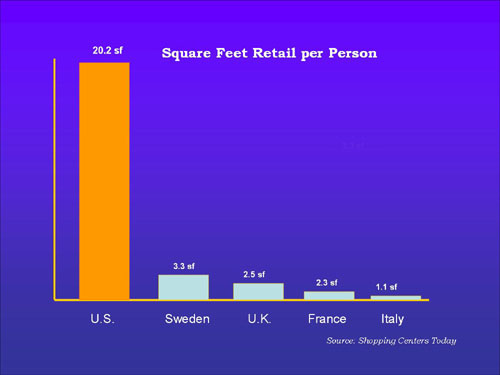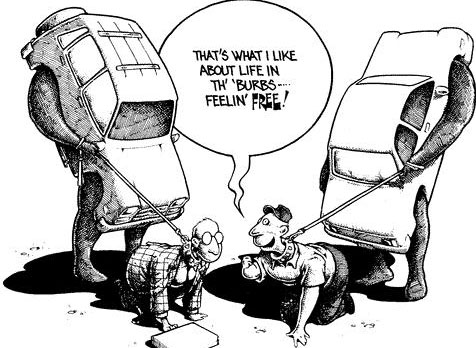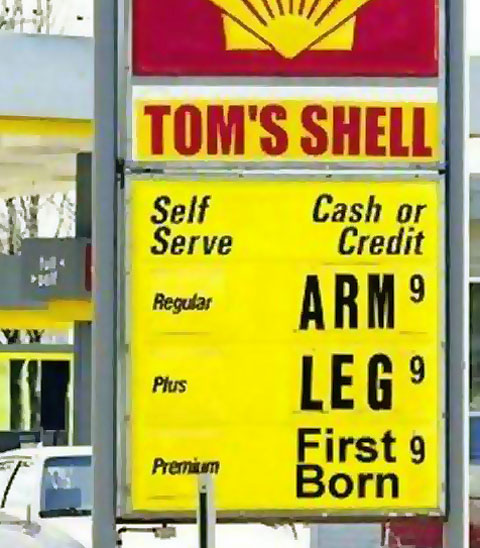SOURCE: JUAN WILSON juanwilson@mac.com
POSTED: 25 JUNE 2007 - 4:30am HST
Peak Suburbia

image above is comparative graph by nation of retail space per person from Shopping Center Today
| by James Kunstler on 25 June 2007 www.kunstler.com I get lots of letters from people in various corners of the nation who are hysterically disturbed by the continuing spectacle of suburban development. But instead of joining in their hand-wringing, I reply by stating my serene conviction that we are at the end of the cycle -- and by that I mean the grand meta-cycle of the suburban project as a whole. It's over. Whatever you see out there now is pretty much what we're going to be stuck with. The remaining things under construction are the last twitchings of a dying organism. It is not an accident that the housing bubble coincided with the phenomenon of Peak Oil. First of all, the housing bubble should more properly be called the suburban bubble, because most of the activity came in the form of "greenfield" housing subdivisions, and included all the additional crap-o-la accessories required by them -- strip malls, power centers, Outback steak houses, car washes, et cetera. The suburban expansion has been based entirely on cheap-and-abundant supplies of oil. Similarly, it was not an accident that the suburban project faltered briefly in the 1970s, when America's oil production entered its long decline, OPEC seized the moment, and oil prices shot up. Notice that the final suburban blowout occurred after 1990, when the North Sea and Prudhoe Bay oil strikes came into full production, disabling OPEC, and a world oil glut finally drove prices as low as ten dollars a barrel in 1999. That ushered in the climactic phase of suburbia, as represented by things like the standard 4000-square-foot Toll Brother's McMansion and the heyday of the super-gigantic SUV to go with it. The American public has no idea how over all that is. The bottom is falling out under not only the housing market (as in houses up for sale) but on the whole apparatus for delivering future houses, and the car-oriented crap associated with it. The production home-builders, such as Toll Brothers, Hovanian, Pulte, et cetera are going down and they will not be coming back. There will be a great deal of wishing that they might come back, but they won't. Likewise, the commercial builders of all the various forms of suburban retail will be waiting to "turn the corner." But they will discover that the wall they have hit has no corner. It's just a wall. For anyone who wonders how much we do not need anymore retail space in America, have a look at this chart (above) showing the comparative amount of retail square-footage allotted for citizens of each nation. Those of you considering the purchase of more WalMart stock, take note. |
SOURCE: JUAN WILSON juanwilson@mac.com
POSTED: 18 JUNE 2007 - 6:30am HST

cartoon by Ben Sargent on 18 Nov 2000, See moreof his work at www.statesman.com
Having it Both Ways
| by James Kunstler on 18 June 2007 on www.kunstler.com It seems to me you can call the situation in Iraq a lot of things, but it's not a war. Not at this point, anyway. Call it an unsuccessful nation-building project, a failed occupation, a botched policing job, a monkey-in-the-middle clusterfuck. All the US political factions, from left to right, do the public a disservice by calling it a war, because it misrepresents what we're doing there. We're involved in Iraq because we don't want to begin thinking about modifying our behavior at home. We are desperate to preserve our access to Middle East oil because that is the only way we can keep running our society the way we're used to running it. Mostly, we don't want to face the tragic misinvestments we've made in the infrastructure of happy motoring, and we don't want to face the inconvenient truth that there really isn't any combination of alt.fuels that will permit us to keep running all the cars the way we like to run them. Either we keep getting the oil or say goodbye to the American Dream Version 2.K. The public has now decided that this nation's primary mission is to find some magic way to keep the cars running on a fuel other than gasoline. Everyone from the greenest greenies to the most medieval-minded Kansas Republican senator has joined in this collective wish. They are certain to be disappointed. All the Priuses in the world will not avail to save the Drive-In Utopia. The public will learn painfully what Iraq is all about. Every time somebody blames the politicians for this predicament, I'm reminded that the politicians are actually doing a fine job of representing what their constituents want. What they want is to not change their behavior. Not even the science and technology folks want to think about changing our behavior. They just want to find new ways to continue the old behavior. They're invested in the triumphal effort to come up with a happy motoring rescue remedy. Their techno-cred is on the line. They all want to be the first kid in their housing subdivision to run a car on dark matter. So, we've gone to Iraq on the quixotic mission to stabilize-and-pacify this key territory in the greater region of the Middle East, so we can keep getting oil imports out of there in a reliable and orderly way, so we can keep on driving all our cars. And the whole thing has turned out rather badly. Now there is another consensus forming. Across the political spectrum, from the far left to the far right, elected officials are now clamoring to "stop the war in Iraq." By this they mean get US troops out. What cracks me up is their juvenile belief that being there is somehow optional for us, that we can keep on running Wal Mart and Walt Disney World without paying any price for it in the costs of policing the Middle East. If we don't maintain a military presence in Iraq, it is perfectly plain what will happen: Iran will instantly gain control of the southern Iraq oil fields. Iraq doesn't have an army anymore. It is incapable of preventing Iran from acquiring control of its territory. From that vantage, Iran would also effectively threaten the sovereign existence of Kuwait. Then there is the question of how much instability Iran could generate next door in the Shia-dominated Persian Gulf shoreline region of Saudi Arabia, where most of that nation's oil lies. (Meanwhile, there will be plenty more Iran-inspired mayhem in Lebanon and the Palestinian territories.) It seems to me the answer to all this is clear: the first thing the US has to do is reach a different consensus about our behavior here at home, starting with the proposition that the happy motoring era must end. If we're not willing to do that, we're eventually going to lose both at home and in our struggles abroad. You can be sure that coming disturbances in the oil markets will make suburban life untenable while exhaustion and bankruptcy breaks our military. The air waves and internet sites are full of blather now about ending the "war" and bringing the troops home. The presidential candidates are agonizing over their various positions on the Iraq adventure. I'd like to hear one of them tell me how Atlanta is going to function without Middle Eastern oil, or how Wal Mart will move its merchandise from San Pedro to Lansing without a "warehouse on wheels," or how the thousands of yellow school bus fleets will carry on next September. Actually, instead, I'd like to hear talk about drastically reforming our zoning laws to discourage any more suburban development or a pitch to allow some of our tax money to fund a US passenger rail revival. I'd like to see a candidate refuse to attend a Nascar race on the grounds that it's an unconscionably stupid fucking waste of energy resources. I'm waiting for one of these birds to tell the American people the truth: you can't have it both ways. you can't get our military out of the Middle East without changing the way we live. |
SOURCE: JUAN WILSON juanwilson@mac.com
POSTED: 29 MAY 2007 - 8:30pm HST
Record gasoline cost, hyperconsumption & slaughter

Climate-change induced drought can also have a major effect and boost fuel demand at a sensitive time. If natural gas were absolutely unlimited and plentiful, there would be a much less harsh energy scenario to offer. But gas has already peaked in extraction in North America. So called solutions such as liquified natural gas, and other technological fixes, are not ready on a massive scale and will not be ready
to stave off petrocollapse.
"took issue yesterday with a private survey that concluded Americans are paying more per gallon than at any time in history when inflation is factored in, [saying] the average price of a gallon of unleaded regular stands at $3.22. The agency pegs the inflation-adjusted record high at $3.29, set in March 1981... The Lundberg Survey, which is conducted every two weeks, said the inflation-adjusted price of a gallon of regular unleaded was $3.18. According to Lundberg, that price beats the 1981 record of $1.35 - or $3.15 in today's dollars." [The Journal News, and Lower Hudson Online, May 24, 2007] |